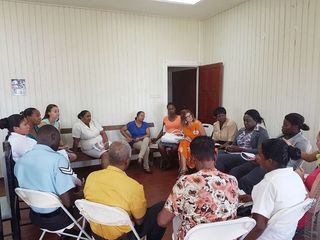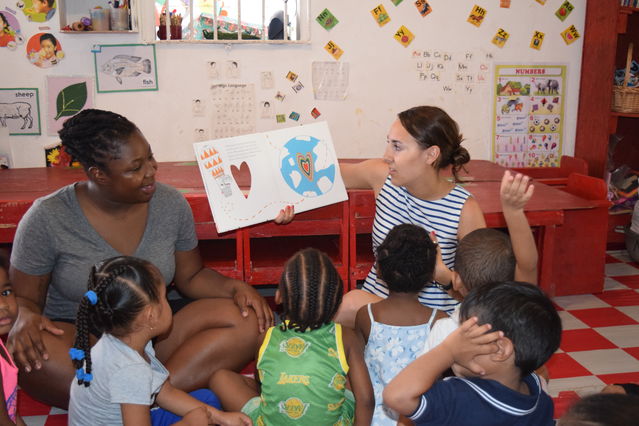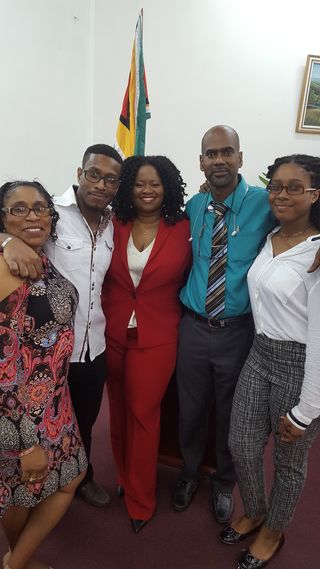
Health
The Importance of Cultural Immersion Programs
Why cultural immersion programs are key for mental health counseling students.
Posted September 29, 2017
by Natalie Cort, Ph.D., guest contributor
The African principle of “Sankofa” translates to “it is not taboo to fetch what is at risk of being left behind.”
In 2015, according to the World Health Organization, Guyana, my country of origin had the highest incidence of suicide worldwide and a significantly underdeveloped mental health system. With that in mind, this past summer I returned to Guyana with a couple of my colleagues and eager students from William James College.

William James, a leader in educating mental health professionals and the largest graduate psychology program in New England, has embarked in pioneering multidimensional efforts to diversify the mental health workforce and improve the quality of care provided to historically marginalized and underserved groups. As a function of efforts to provide culturally competent training, William James developed the Center for Multicultural and Global Mental Health (CMGMH). CMGMH’s mission is to be a preeminent academic, clinical training, and research center that trains and educates psychology graduate students to address mental health disparities and serve culturally diverse individuals. Consequently, students in CMGMH’s academic concentrations in Latino Mental Health, African & Caribbean Mental Health, and Global Mental Health are provided with opportunities to participate in international cultural immersion trips to Kenya, Ecuador, Haiti, and Guyana.
In late July, I along with William James College faculty colleagues, Drs. Jill Bloom and Elana Wolkoff and six Global Mental Health concentration students [Rebeccah Jeannette Costa, Ronny Nevo, Leana Simpson, Hermeline Pierre, Ashley Christine White, Alexis Louise Digasso], embarked on William James College’s inaugural 10-day long service learning and cultural immersion trip to Guyana.

In a collaborative partnership with the Guyana Foundation, a charitable trust, our team conducted a two-day suicide gatekeeper training with community leaders, law-enforcement officials and medical personnel to increase their ability to effectively respond to, intervene, and support suicidal individuals. Furthermore, we facilitated children empowerment workshops with parents, caregivers, and educators at Sherjoy Daycare, Playgroup, and Nursery, and the Guyana District of the Methodist Church in the Caribbean and the Americas.
To better understand and effectively respond to the unique mental health needs of Guyanese people, William James' students immersed themselves in Guyana’s cultural traditions and practices. As a result, their development and facilitation of culturally-informed workshops, along with yoga and expressive arts activities were deeply appreciated by workshop participants.The students who participated in the immersion program this summer now have an increased awareness of ethics and standards appropriate to professional practice with racially/ethnically diverse populations. This experience in Guyana also helped to enhance their competence in building effective therapeutic relationships with immigrant populations.
Alexis Digasso, a third-year clinical psychology doctoral student, attended the Guyana cultural immersion trip and felt she walked away feeling more confident in how to effect change in a global mental health setting. “This experience was incredibly rewarding and I am proud of the work we did. I believe our work helped to embolden professionals from all realms of the Guyanese workforce to act as gatekeepers within their communities, by providing them with the knowledge and skills necessary to intervene with individuals and systems,” said Alexis. “I love that the work we did in Guyana is directly related to my schooling and the work I can see myself doing when I have my degree.”

Alexis interacting with Guyanese children
Programs like the Guyana Service Learning & Cultural Immersion Program are important experiences for mental health professionals in training because they provide students with an expanded perspective of global mental health as it relates to their training. Cultural immersion experiences clearly enhance students’ multicultural knowledge, appreciation, and expertise, in ways that are particularly beneficial to their clients from historically marginalized groups and underserved communities.

Returning to my homeland after 26 years to both give my students an enriching experience and provide mental health support to Guyana’s resilient and compassionate people represents my personal commitment to the African principle of “Sankofa.” It is never taboo to fetch what is at risk of being left behind and I think that principal should translate to how we approach global mental health as psychology and mental health educators.
Dr. Natalie Cort is a licensed clinical psychologist, an assistant professor in the Clinical Psychology Department and Core Faculty in the Concentration on Children and Families of Adversity and Resilience, and Center for Multicultural and Global Mental Health at William James College. She is also the Director of William Jame's Black Mental Health Graduate Academy.

